
In Old Chicago is a 1938 American disaster musical drama film directed by Henry King. The screenplay by Sonya Levien and Lamar Trotti was based on the Niven Busch story, "We the O'Learys". The film is a fictionalized account about the Great Chicago Fire of 1871 and stars Alice Brady as Mrs. O'Leary, the owner of the cow which started the fire, and Tyrone Power and Don Ameche as her sons. It also stars Alice Faye and Andy Devine. At the time of its release, it was one of the most expensive movies ever made.

Heaven Can Wait is a 1943 Technicolor American supernatural comedy film produced and directed by Ernst Lubitsch. The screenplay was by Samson Raphaelson based on the play Birthday by Ladislaus Bus-Fekete. The music score was by Alfred Newman and the cinematography by Edward Cronjager.

Don Ameche was an American actor, comedian and vaudevillian. After playing in college shows, repertory theatre, and vaudeville, he became a major radio star in the early 1930s, which led to the offer of a movie contract from 20th Century Fox in 1935.
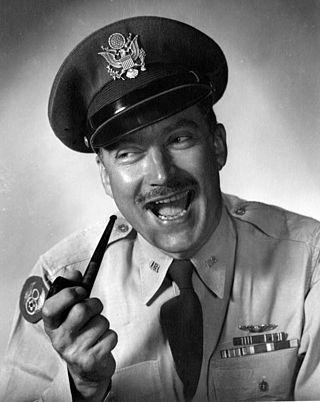
MacKinlay Kantor, born Benjamin McKinlay Kantor, was an American journalist, novelist and screenwriter. He wrote more than 30 novels, several set during the American Civil War, and was awarded the Pulitzer Prize for Fiction in 1956 for his 1955 novel, Andersonville. He also wrote the novel Gettysburg, set during the Civil War.

Jane Eyre is a 1943 American film adaptation of Charlotte Brontë's 1847 novel of the same name, released by 20th Century Fox. It was directed by Robert Stevenson and produced by the uncredited Kenneth Macgowan and Orson Welles; Welles also stars in the film as Edward Rochester, with Joan Fontaine playing the title character.

Jeanne Bates was an American radio, film and television actress. After performing in radio serials, she signed a contract with Columbia Pictures in 1942 which began her career in films both in small parts and larger roles in a series of horror films and noirs, including The Return of the Vampire (1943) and Shadows in the Night (1946).
"Mr. & Mrs. John Sacrimoni Request..." is the 70th episode of the HBO original series The Sopranos and the fifth of the show's sixth season. Written by Terence Winter and directed by Steve Buscemi, it originally aired on April 9, 2006.
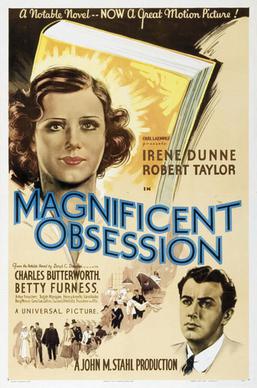
Magnificent Obsession is a 1935 drama film based on the 1929 novel of the same name by Lloyd C. Douglas. The film was adapted by Sarah Y. Mason, Victor Heerman, and George O'Neil, directed by John M. Stahl, and stars Irene Dunne, Robert Taylor, Charles Butterworth, and Betty Furness.
"The Happy Wanderer" is the 19th episode of the HBO original series The Sopranos and the sixth of the show's second season. It was written by Frank Renzulli, directed by John Patterson, and originally aired on February 20, 2000.

Raymond William Hatton was an American film actor who appeared in almost 500 motion pictures.
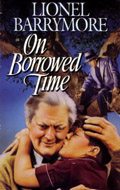
On Borrowed Time is a 1939 film about the role death plays in life, and how humanity cannot live without it. It is adapted from Paul Osborn's 1938 Broadway hit play. The play, based on a novel by Lawrence Edward Watkin, has been revived twice on Broadway since its original run.
James Jewell was an American radio actor, producer and director at radio station WXYZ, Detroit, Michigan.
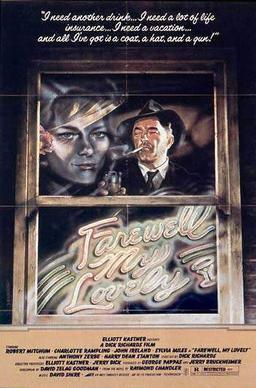
Farewell, My Lovely is a 1975 American neo-noir crime thriller film directed by Dick Richards and featuring Robert Mitchum as private detective Philip Marlowe. The picture is based on Raymond Chandler's novel Farewell, My Lovely (1940), which had previously been adapted for film as Murder, My Sweet in 1944. The supporting cast features Charlotte Rampling, John Ireland, Jack O'Halloran, Sylvia Miles, Harry Dean Stanton, Joe Spinell, Sylvester Stallone and hardcore crime novelist Jim Thompson, in his only acting role, as Charlotte Rampling's character's elderly husband Judge Grayle. Mitchum returned to the role of Marlowe three years later in the 1978 film The Big Sleep, making him the only actor to portray the character more than once in a feature film.
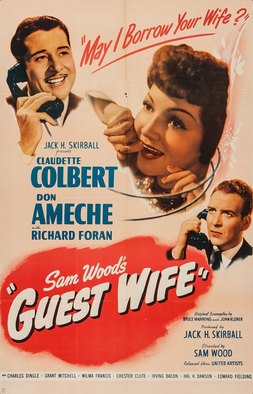
Guest Wife is a 1945 American comedy film directed by Sam Wood, written by Bruce Manning and John Klorer, and starring Claudette Colbert, Don Ameche, and Dick Foran. It is also known as What Every Woman Wants.

The Raven is a stylized silent 1915 American biographical film of Edgar Allan Poe starring Henry B. Walthall as Poe. The film was written and directed by Charles Brabin from a 1904 play and 1909 novel by George C. Hazelton.

Swanee River is a 1939 American biographical musical drama film directed by Sidney Lanfield and starring Don Ameche, Andrea Leeds, Al Jolson, and Felix Bressart. It is a biopic about Stephen Foster, a songwriter from Pittsburgh who falls in love with the South, marries a Southern girl, then is accused of sympathizing when the Civil War breaks out. Typical of 20th Century-Fox biographical films of the time, the film was more fictional than it was factual.

The Romance of Rosy Ridge is a 1947 American Western film directed by Roy Rowland, about a rural community bitterly divided during the aftermath of the American Civil War. It stars Van Johnson, Thomas Mitchell, and Janet Leigh in her film debut. It was adapted from the novel of the same name by MacKinlay Kantor.
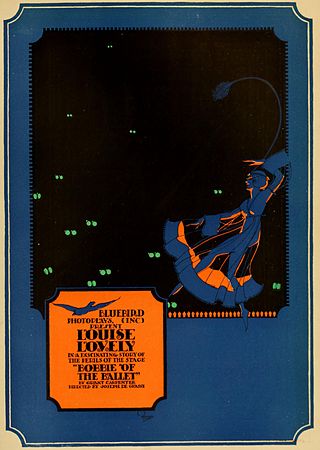
Bobbie of the Ballet is a 1916 American silent drama film directed by Joe De Grasse and starring Lon Chaney, Louise Lovely, Gretchen Lederer and Jay Belasco. It was written by Ida May Park, based on a story by Grant Carpenter.

Flying High is a 1931 American pre-Code musical film released by Metro-Goldwyn-Mayer, produced by George White, with lyrics by B. G. DeSylva and Lew Brown, music by Ray Henderson and additional songs by Dorothy Fields (lyrics) and Jimmy McHugh (music). The film originally featured two Technicolor sequences which apparently only survive in black and white. The cast featured Bert Lahr, Charlotte Greenwood, Pat O'Brien, Charles Winninger and Hedda Hopper, with Gus Arnheim and his orchestra.
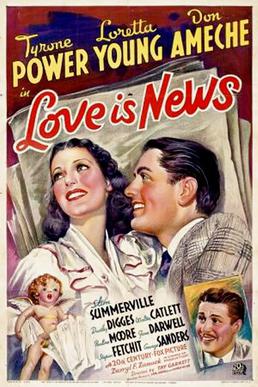
Love Is News is a 1937 American romantic comedy film starring Tyrone Power, Loretta Young, and Don Ameche. The movie was directed by Tay Garnett and was the first film for which Power had top billing. The picture was remade in 1947 as That Wonderful Urge, with Power again and Gene Tierney.

















